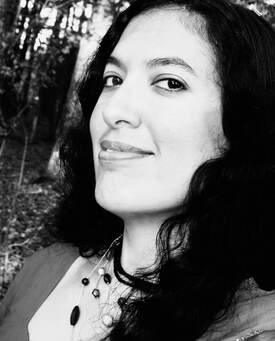HusksAbuelita tells me that I was born in the month of Tlaloc: Part jaguar, part thunder and rain—grown like corn, in a smoggy valley downstream from the Iztaccihuatl. There, we knew how to cook for the dead: tamales sweet as suffering. With molcajetes, we mashed hearts stuffed with the blood of truths omitted while loving. I don’t remember the bullet that split Julio’s skull. But, imagine Mother hypervigilant for the sky falling. Death threats, caseloads of Bacardi, comida cold. Joy coagulates, like cars on the periférico. Finally, we see corruption’s fangs taller than any volcanos. Negrita is left at the pound. All night, camote carts cry. Then came the trunks, the take-only-what-you-need, leave the snow on the Ajusco, take Juanita Perez. Feel the bloody slice of the interim between indigena and immigrant. Here, my estadounidense classmates pretend I don’t exist. Abuelita dies. Even Tlaloc forgets me in this blurry desert: Santa Anas in our eyes, on the stingy side of survival. Somedays, we even let ourselves feel the grinding of the stone, identity sifting, the flattening of the rolling pin. Next time, consider keeping all the husks when you peel me. Nursemaid MagicFear runs like a headless chicken flapping into you at the market, when you least expect it to— wings tossing up dirt long after the machete has been wiped clean of blood. The blade is our phone. It swings at safety every time the calls arrive: “Los vamos a fusilar!” Meanwhile, Mami draws lines in the rugs pacing—she squawks, her feathers awry. Some will grab the rosary, others the gun. There is no time to wait for pricy milagros in the Plaza de la Conchita. But I was with Juanita making maza and, I swear, she left the virgencita on her gold throne, and summoned the pumas, monkeys and nāhuallis down from her verdant Oaxacan hills instead, right into our kitchen in the big city. She wove protective spells into my black braids, combed out my anxiety with her whispery Náhuatl, took me straight to the moon of her smiling face. Some will burn copal, others learn about battle from the zing-zing of hummingbirds. It’s no wonder Mami, to this day, though safely tucked into a California suburb, refuses to answer her phone: She didn’t have a nursemaid like my Juanita. The Body RemembersMy Abuelita nearly died in the fire that ate her songbirds, in the city Dad came from-- where he played the violin. Maybe it was cigarettes, maybe spontaneous combustion. We don’t talk about those things that happened in Juarez, where youth was bought and sold, like trinkets at the border. But ask my mother and she’ll tell you how Alzheimer’s brought it all back. How the body resurrects wounds before it dies: harkens back to terror through touch. After the brain falters, after fighting, escaping, crossing, sweating, surviving. You still die under a conquistador’s swinging sword. I prefer fire.  Katarina Xóchitl Vargas was raised in Mexico City. She and her family moved to San Diego when she was 13, where she began composing poems to process alienation. A dual citizen of the United States and Mexico, today she lives on the east coast where—prompted by her father’s death—she’s begun to write poetry again and is working on her first chapbook. Somos en escrito is delighted to be the first to publish her writings.
0 Comments
Your comment will be posted after it is approved.
Leave a Reply. |
Archives
July 2024
Categories
All
|
Donate and Make Literature Happen
is published by the Somos En Escrito Literary Foundation,
a 501 (c) (3) non-profit, tax-exempt corporation. EIN 81-3162209


 RSS Feed
RSS Feed